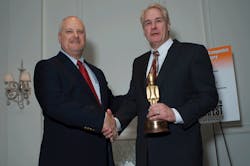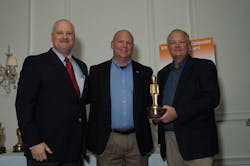To raise awareness and recognize top-performing manufacturers that have realized the widespread benefits of a strong safety program, Rockwell Automation announced its first Manufacturing Safety Excellence Awards commemorating the world’s safest manufacturing companies.
The winners – General Motors Co., PepsiCo Inc. and Procter & Gamble Co. (P&G) – were selected because for them, safety is more than a priority, it’s a core value.
“These best-in-class companies have a robust safety culture that’s defined by continuous improvement,” said Mark Eitzman, safety market development manager, Rockwell Automation. “They take a comprehensive approach to safety by successfully integrating safety practices between the engineering and environmental health and safety (EHS) departments. This enables the kind of collaboration that reaches far beyond simple compliance to deliver improved plant productivity and greater efficiencies, and dramatically lower injury rates.”
General Motors: General Motors’ collaboration with industrial automation companies has played a central role in developing some of today’s most innovative safety-automation technologies that help improve worker safety while also increasing production throughput in assembly applications.
That same technology now is helping manufacturers across a wide range of other industries realize similar benefits. General Motors makes safety a visible commitment at every level across the company. It also shows a strong commitment to improving worker safety outside of its own walls by continuously dedicating resources and expertise to help develop U.S. and international safety standards.
PepsiCo: PepsiCo successfully maintains a rigorous corporate-safety program across its global manufacturing sites. The safety program includes accountability that is driven from the top down, as well as adherence to a set of global standards that are embraced across the company.
Procter and Gamble: Procter and Gamble (P&G) combines its engineering and EHS functions under the same leadership, which improves worker safety. This especially is helpful because the two departments have a greater understanding of the other’s job and can work toward common goals when upgrading or sourcing new machinery.
This collaboration also results in a unified approach to safety-standards compliance and helps ensure consistency across all machinery in all plants. P&G also holds its vendors and material suppliers to the same high standards to help mitigate risk throughout the supply chain.
While some manufacturers still view plant-floor safety as a burdensome and costly obligation that adds little value to overall operations, companies like these Manufacturing Safety Excellence Award winners have made people and plant safety a core company value by incorporating the three key pillars of a comprehensive safety program – a strong safety culture, a formalized compliance strategy and capital investments in technologies that integrate safety and standard control systems. Studies show that manufacturers with a strong safety culture, a formalized strategy and capital investments in technology realize greater gains in efficiency, productivity and profitability.



